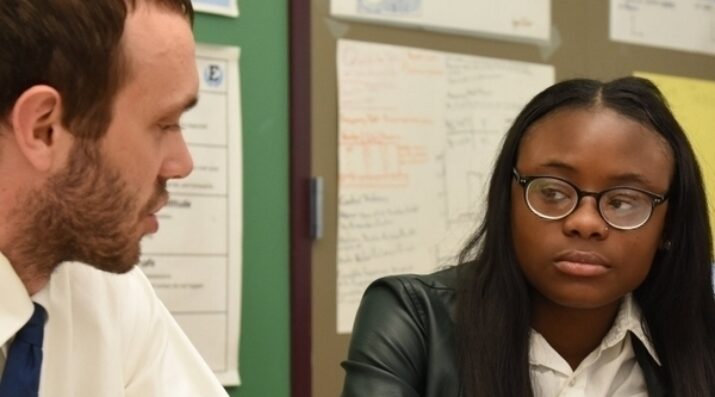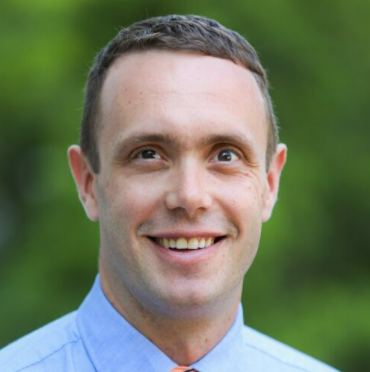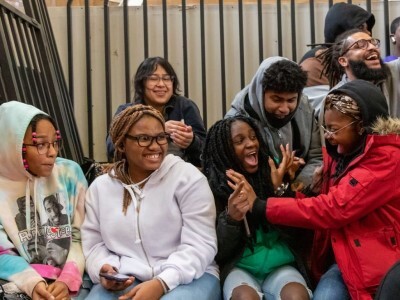Enabling Change
A Lawyer Walks into a Classroom
Topics

Next generation learning is all about everyone in the system—from students through teachers to policymakers—taking charge of their own learning, development, and work. That doesn’t happen by forcing change through mandates and compliance. It happens by creating the environment and the equity of opportunity for everyone in the system to do their best possible work.
How my experience as an attorney helps me teach—and how you can apply that in your own classes (without enduring law school!).
One of my favorite things about teaching is, without a doubt, the diversity of my colleagues. I've been fortunate to teach alongside educators from different backgrounds, with different interests and talents, who have challenged and inspired me in different ways. I've grown tremendously as a result.
In this space I've written articles in several capacities: as a classroom teacher, as a curriculum designer, and as the co-founder of The Modern Classrooms Project. Today, I want to share another perspective that I bring to my classes: my background and experiences as a lawyer. Prior to teaching high-school math I spent several years learning to "think like a lawyer," and I believe that way of thinking contributes in many ways to the way I teach.
You may or may not have a positive impression of lawyers—either way could be justified! Nevertheless, I think there are two habits of mind that I developed as a lawyer which have helped me become a better educator, and which I think can help others as well.
Habit #1: Think Individually
Lawyers represent clients in individual matters. To be effective, a lawyer must know, inside and out, the facts of a particular case in order to develop those arguments that are best supported by the facts. Without a thorough knowledge of what actually happened in a given matter, no lawyer's case can be effective.
The same is true for teachers and students. As a teacher, I teach classes full of students—but ultimately I must find a way to reach every single student as an individual. Students are different, and to be truly effective I must recognize that: I need to know what each student knows, and needs, so that I may do my best in each individual case. I must know more than just what each student scored on the last test: I need to know her strengths and weaknesses, her interests, the abilities she possesses, and the obstacles she faces. In the same way a lawyer interviews a client to know everything about a case, I should consult with each student to know what I need to do.
This is, of course, a high bar—I'll be the first to admit that I rarely meet it. Yet there are several things I do to get to know my students better, as individuals. I've replaced my lectures with videos, for instance, so that I can spend class time in higher-quality interactions with students. I give my students projects that involve choice, so I can understand what interests and motivates students. And I ask my students to reflect regularly, so that I know how they are growing as learners, and in what ways they want to improve. I still don't have as much time as I'd like to get to know each student. But I try to understand each individual student as best I can.
Habit #2: Think Systematically
Lawyers recognize that their individual cases occur within larger systems, governed by larger principles, and in the interests of their individual clients, lawyers will also advocate for systematic change. Picture the defense attorney, for instance, who represents a client on death row while simultaneously advocating for an end to capital punishment. Attempts to improve lives while creating better institutions often go hand in hand.
Educators must engage in these kinds of efforts as well. As teachers, we see first-hand—for better or for worse—the effects of educational policies on our students, and we have a responsibility to push for the practices and principles that we know best serve our students. In our classrooms, we must institute rules that challenge students to be their very best; in our schools, we must set examples of effective teaching practices; in our districts, we must stand up for our own visions of what schools should be. Our students deserve no less.
I haven't joined any protest marches recently—though I'm inspired by all my peers who have—but I still think of myself as someone trying to lead a movement, no matter how small. Within the constraints of the curriculum I'm given, I try to create student-centered learning environments that respect students as individuals. Within my school, I share my ideas with colleagues and learn from theirs as well. And small as my voice is, as one teacher among millions, I use this space and others to advocate for the kinds of educational experiences I believe our students need. At the very least, it helps crystallize what kind of classroom I want to create for my students.
*****
I don't believe that this way of thinking is unique to lawyers—many other professionals use similar combinations of detail-oriented and structure-level thinking. Many teachers already do! But, in the day-to-day grind of planning lessons, grading papers, and keeping up with content, it's easy to lose sight of the individual- and system-level challenges that are at the heart of education. If we as teachers are going to give each one of our students the educations they need, while building better schools for the future, we'd do well to keep both types of thinking in mind.




